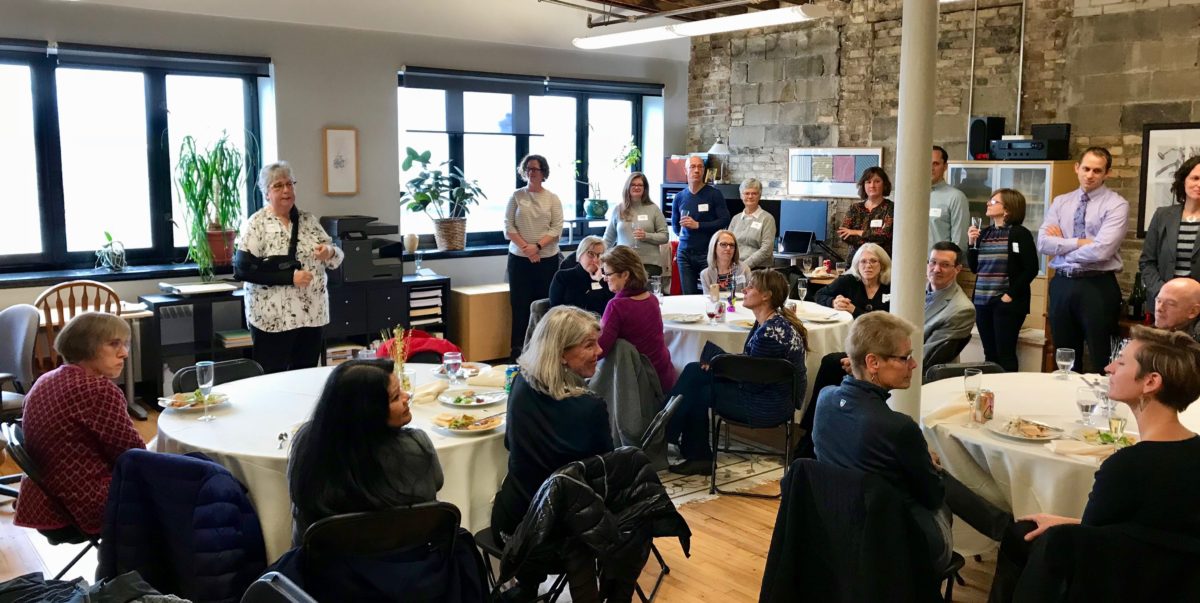
Image: Julia Classen’s Retirement Party
In my family, there are many generations of community service, and for that I am grateful. My mother chaired the public health board in our small New Jersey town and co-founded the first hospice in Wyoming, while my father was part of the First Aid Squad – the predecessors to what we know today as first responders. Their parents gave their time and dedication to civic organizations, a local hospital and church.
I’m grateful for my altruistic family because it sparked a passion in me for the work of nonprofits that has fed my spirit and shaped my life. Right after undergrad, I worked as an advocate in the field of sexual assault, then for a sexual abuse prevention program. I can trace the beginnings of my lifelong interest in nonprofit boards and leadership development to that time, as well. Founding Aurora Consulting in 2002 with Sharon Roe Anderson was a dream come true: I could focus all my energy on board and leadership development, and strategic planning. For 15 years, that’s been my piece of the puzzle. As I’ve made my plans to leave Aurora in the very capable hands of Al and Sarah, it’s become their piece of the puzzle as well.
Shifting Sands in the Nonprofit Sector
Much has changed in the world since 2002. I’m proud of the way people and practices in the nonprofit sector have adapted and grown. The best leaders in this sector are relentlessly generous, and I admire them greatly. It takes a special energy and strength of will to hold onto that spirit of giving and kindness in the face of intractable challenges.
If someone asked me to identify essential changes I’ve seen during my career with Aurora, I would point to these shifts:
Movement from Individual Leadership to Co-Leadership.
Leadership in nonprofits used to be positional, with a strict line between the roles of board and staff. Today, we see leadership as a partnership between board and staff. We also practice facilitative leadership as a more powerful model that brings everyone’s strengths to bear on complex problems. I’ve seen the definition of leadership expand from functions and tasks to strategic thinking and actions, and to constant attention to the contexts of all key stakeholders.
Growing Value of Evaluation.
The need for nonprofits to understand, describe, and demonstrate their impact has mushroomed. Evaluation is a transformative tool. And, impact is not just about justifying dollars; it’s about better understanding our work in our communities, improving our organizations, and sharing the approaches that are tried and the learning that follows.
Impact of Intersectionality on Nonprofit Work.
Our collective focus on diversity and inclusion brings a need to view problems and solutions through the lens of intersectionality. As research has shown, the most urgent social issues of our time are tightly linked. The complexity of issues and of diverse perspectives means the answers are not simple. An issue like poverty is tied to housing laws, community development, health, employment opportunities, personal and family safety, education, food and shelter, disparate incarceration rates and historical and systemic oppression. Nonprofits working at the intersection of multiple, diverse communities and developing solutions and partnerships to complex address issues like poverty are the ones leading the way.
Embrace Complexity, Have Partners and Patience
For those of us who’ve found our life’s work in nonprofits, and for those soon to join us, the keys to thriving in this evolving world are embracing complexity and having patience. If we understand the complexity, and the need to welcome all in contributing good solutions, we will forge a positive path forward.
The size and complexity of today’s problems makes them impossible for one person or one organization to solve alone. As individuals, we cope by asking ourselves, “What is my piece of the puzzle?” and “How can I work collaboratively with others focused on different pieces?” I truly believe that partnership is our best chance for large-scale change.
Finally, have patience. I don’t mean be complacent. Nor do I mean that you should not capture and leverage the urgency for change when it arises – that “fierce urgency of now,” which Dr. Martin Luther King, Jr. spoke of. We must all act with courage and integrity in the face of injustice. Patience is needed to build long-term trusting relationships that will fuel prolonged change. Find the patience to give new ideas time to work and relationships to build. People are capable of tremendous change, especially when they have time to feel it in their hearts.
My own heartfelt thanks go to the many wonderful people I’ve met and worked with in nonprofits for so many years. To Al and Sarah – I’m very excited to see where you’ll take Aurora next! You are smart, talented, skillful and insightful. I look forward to seeing you grow and shape Aurora to help support, lead and sustain the nonprofit sector that we all dearly love.
